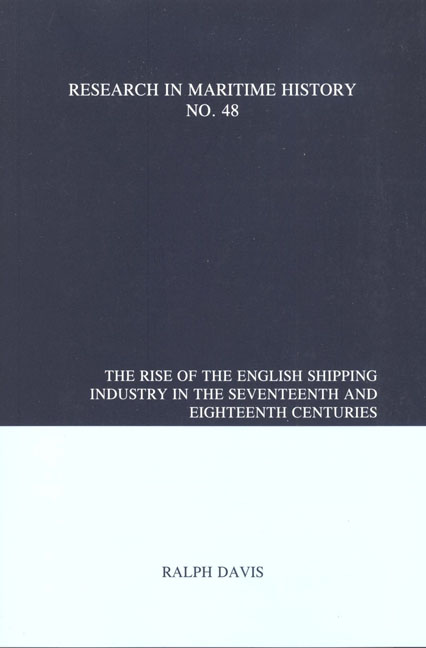Book contents
- Frontmatter
- Contents
- Introduction to the 2012 Edition
- Series Editor's Note
- Introduction
- Preface
- Chapter 1 The Widening of Horizons, 1560-1689
- Chapter 2 Consolidation, 1689-1775
- Chapter 3 Ships and Shipbuilders in the Seventeenth Century
- Chapter 4 Ships and Shipbuilders in the Eighteenth Century
- Chapter 5 The Shipowners
- Chapter 6 The Merchant Seamen
- Chapter 7 The Pay and Conditions of Merchant Seamen
- Chapter 8 Shipping Management and the Role of the Master
- Chapter 9 Shipping and Trade
- Chapter 10 The Nearby and Northern European Trades
- Chapter 11 The Southern European and Mediterranean Trades
- Chapter 12 The East Indian Trade
- Chapter 13 The American and West Indian Trades
- Chapter 14 The Government and the Shipping Industry
- Chapter 15 War and the Shipping Industry
- Chapter 16 Four Ships and Their Fortunes
- Chapter 17 Was It a Profitable Business?
- Chapter 18 Conclusion
- Appendix A A Note on the Shipping Statistics, 1686-1788
- Appendix B Sources for the History of the Shipping Industry
- Index
Chapter 8 - Shipping Management and the Role of the Master
- Frontmatter
- Contents
- Introduction to the 2012 Edition
- Series Editor's Note
- Introduction
- Preface
- Chapter 1 The Widening of Horizons, 1560-1689
- Chapter 2 Consolidation, 1689-1775
- Chapter 3 Ships and Shipbuilders in the Seventeenth Century
- Chapter 4 Ships and Shipbuilders in the Eighteenth Century
- Chapter 5 The Shipowners
- Chapter 6 The Merchant Seamen
- Chapter 7 The Pay and Conditions of Merchant Seamen
- Chapter 8 Shipping Management and the Role of the Master
- Chapter 9 Shipping and Trade
- Chapter 10 The Nearby and Northern European Trades
- Chapter 11 The Southern European and Mediterranean Trades
- Chapter 12 The East Indian Trade
- Chapter 13 The American and West Indian Trades
- Chapter 14 The Government and the Shipping Industry
- Chapter 15 War and the Shipping Industry
- Chapter 16 Four Ships and Their Fortunes
- Chapter 17 Was It a Profitable Business?
- Chapter 18 Conclusion
- Appendix A A Note on the Shipping Statistics, 1686-1788
- Appendix B Sources for the History of the Shipping Industry
- Index
Summary
The problems of management of a ship differed in many ways from those of a business on dry land. The owning group was often too large to exercise control efficiently, some of its members incapable of taking part in management and many too occupied with other concerns to give much attention to a particular shipping investment. As we have seen, shipowning was no man's whole business and few men's main business; the owning group had, as it were, some part-time directors and a works manager (the master) but no full time general manager unless the master filled this office too. During long periods the ship was beyond the owners’ direct control, even beyond the jurisdiction of the English law; for months at a time there was little that the most agitated of owners could do to secure his interests except take out more insurance. The greatest problem of management, indeed, can be put in a nutshell; to find a paragon to be master, and then devise means to assist him if he really were perfect, rescue him if he turned out a fool, and restrain him if he turned out a scoundrel. This does not mean that managing owners, and the whole owning group, had no function at all beyond the provision of the initial capital; but simply that the exercise of their functions was intermittent, and immense trust had to be placed in a single individual who, though he was usually a partowner like themselves, was nevertheless primarily an employee. This is one reason why owners so often sought to appoint masters who would be bound by more than mere financial ties; a reason for the frequent employment of sons, brothers, nephews or cousins of the owners or their business associates; for the difficulty which seamen who had nothing to offer but a record of competence and reliability faced when attempting to become masters, unless they could find the money to become major part-owners. Nepotism was by no means a wholly discreditable and absurd practice; there were solid reasons for it, but the price had to be paid, of course, in the acceptance in positions of command of men were in fact of poorer quality than others who were available but outside the family circle.
- Type
- Chapter
- Information
- The Rise of the English Shipping Industry in the Seventeenth and Eighteenth Centuries , pp. 153 - 168Publisher: Liverpool University PressPrint publication year: 2012



